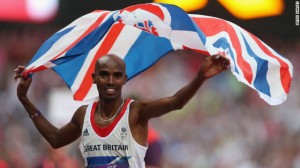Specialist Dental Group has launched an on-going series of blog posts by our individual dental specialists. All views provided are the dentist’s own opinions and are posted on this blog as part of our on-going efforts to educate the public about dental issues and other matters of interest relating to dentistry and healthcare.
 The 30th Summer Olympic Games which was held in London, England, is finally over. Many people are happy because now they don’t need to wake up in the middle of the night to watch the games. This Olympic Games is special in a sense that this is the third time that London managed to host the Games – the other times were in 1908 and 1948.
The 30th Summer Olympic Games which was held in London, England, is finally over. Many people are happy because now they don’t need to wake up in the middle of the night to watch the games. This Olympic Games is special in a sense that this is the third time that London managed to host the Games – the other times were in 1908 and 1948.
The Olympics motto was proposed by Pierre de Coubertin in 1894: “Faster, Higher, Stronger”, which in Latin is Citius, Altius, Fortius. Mr. De Coubertin borrowed it from his athletics enthusiast friend, Priest Henri Didon.
As time passed, the nature of the Games deviated a little from the motto. For example, archery is not exactly in line with the motto even though winning any medals in the Games is proof of dedication, personal sacrifice and excellence on the part of the athlete(s). On the other hand, this “Faster, Higher, Stronger” motto is totally in line with all the track and field events. Although track and field events traditionally start off during the second week of the Olympic Games, many people regard these as the ‘Real Opening’ of the games. The Games also end with an athletic event, the men’s marathon.
It is no secret that some countries do better in the marathon events. Some credit it to their genes, some say it is their culture, food, climate, or simply a result of the transportation system in the country. However, the common factor among all successful distance runners is mileage. This year, Mo Farah (Mohammed Farah) from Great Britain managed to win double Gold medals in 5000m and 10000m events. He said that he was running about 190km+ a week.
In the history of the Olympics, there are only a few people who have managed to win double gold medals like that. The most well known is the legendary “Czech Locomotive,” Emil Zatopek, who topped that feat with a marathon gold all in the same 1952 Summer Olympics. Now the real test is to see if Mo Farah can show off his marathon ability in the next Olympic games.
It is known that among elite marathon runners, their weekly volume of training can easily reach 300km. Some Japanese world-class runners sometime do over 100km in a day so that they ‘get used to’ the distance and as a result a 42.195km marathon may feel like a ‘sprint’. It is all about the preparation. Well, for mere mortals, we may not be able to run like these professionals. However, surprisingly, it is amazingly like running one’s life!
My grandmother used to say: “In order to reach high, be prepared. In order to reach higher, be super prepared!.” She went on to say, “Don’t rush. Take a baby step at a time. It is not about the prize (money or trophies of any kind), it is about taking part and having a good reputation (staying healthy).”
Many people also heard of a more informal Olympic motto, also introduced by De Coubertin, which is: “The most important thing is not to win but to take part!” He came up with this motto from a sermon by the Bishop of Pennsylvania during the 1908 Olympic Games in London. This is actually very similar in the sport of healthcare too…

Dr. Ansgar C. Cheng is a Dental Specialist in Prosthodontics (Teeth Replacement) with Specialist Dental Group. He is also an Adjunct Associate Professor with the National University of Singapore. He has a special interest in dental implants, cosmetic dentistry and treatment of medically compromised patients, including cancer patients. For more information about Dr. Cheng, click here





